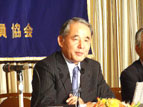Creating A New Style of Japanese Management: Keizai Doyukai's Report
Takahiro MIYAO (Professor and Head, Japanese Institute of Global Communications, IUJ)
| FCCJ Professional Luncheon:
|
| Date/Time: | July 23 (Wednesday) 12:30-14:00 |
| Place: | Foreign Correspondents' Club of Japan, Yurakucho, Tokyo |
| Program: |
12:30 - 13:15
Speaker: Yasuchika Hasegawa (Vice Chairman, Keizai Doyukai, and President, Takeda Pharmaceutical Company)
13:15 - 14:00:
Q&A
|
| Organizer: | Foreign Correspondents' Club of Japan (http://www.fccj.or.jp) |
 Mr. Yasuchika Hasegawa, president of Takeda Pharmaceutical Company Ltd., gave a luncheon talk as Vice Chairman of Keizai Doyukai (Japan Association of Corporate Executives) at FCCJ on July 23. In his presentation, Mr. Hasegawa summarizes a report entitled "Creating a New Style of Japanese Management," just published by the Committee on Corporate Management of Keizai Doyukai, where the report was largely written by Mr. Hasegawa as the committee chairman, based on questionnaire responses by member executives. Mr. Yasuchika Hasegawa, president of Takeda Pharmaceutical Company Ltd., gave a luncheon talk as Vice Chairman of Keizai Doyukai (Japan Association of Corporate Executives) at FCCJ on July 23. In his presentation, Mr. Hasegawa summarizes a report entitled "Creating a New Style of Japanese Management," just published by the Committee on Corporate Management of Keizai Doyukai, where the report was largely written by Mr. Hasegawa as the committee chairman, based on questionnaire responses by member executives.
The main purpose of this report, according to Mr. Hasegawa, is to identify the strengths and weaknesses of the Japanese style of management in its present form, and suggest ways to reform the management style while maintaining its strengths in order to increase business productivity and competitiveness in the current business environment. As perceived by Mr. Hasegawa and his colleagues, the strengths of Japanese management include long-term perspectives, precise implementation based on consensus, information exchange to integrate business activities including affiliated companies, abilities to create new production processes as well as environmentally friendly technologies and products, etc. Other strengths, pointed out in questionnaire responses by member executives, are special emphasis on quality and safety, strong sense of loyalty among employees, high level of education and teamwork spirit among employees, etc.
On the other hand, weaknesses include exclusion of non-Japanese nationals, reliance on trust rather than contracts, decision making based on consensus, lack of proficiency in foreign languages, etc. In view of a rapidly changing business environment such as globalization, technological innovation as well as population-environment-resource problems, those managerial weaknesses must be corrected and a new style of Japanese management should be established by taking account of current and future challenges for Japan in general and Japanese business in particular.
Those challenges are (1) leadership in Asia and also in the environment field, (2) competitiveness from the global and long-term viewpoint, and (3) contribution to the international community for solving global issues, according to the Keizai Doyukai report. To face these challenges, Japanese business should be more flexible in introducing some positive aspects of American and European style management while maintaining and enhancing the strengths of Japanese style management in the future.
After Mr. Hasegawa's presentation, an active Q&A session took place, where a number of important questions were raised by foreign correspondents. There were no clear answers given by Mr. Hasegawa to such questions as how to deal with possible contradictions in introducing the individualistic and innovative aspects of American management, while maintaining the group-oriented aspect of Japanese management, and whether Keizai Doyukai's proposal this time will be successful in changing Japanese-style management for the better in the near future.
This report is adopted from the following blog (with its Japanese translation):
http://glocom.blog59.fc2.com/blog-date-20080723.html
|





